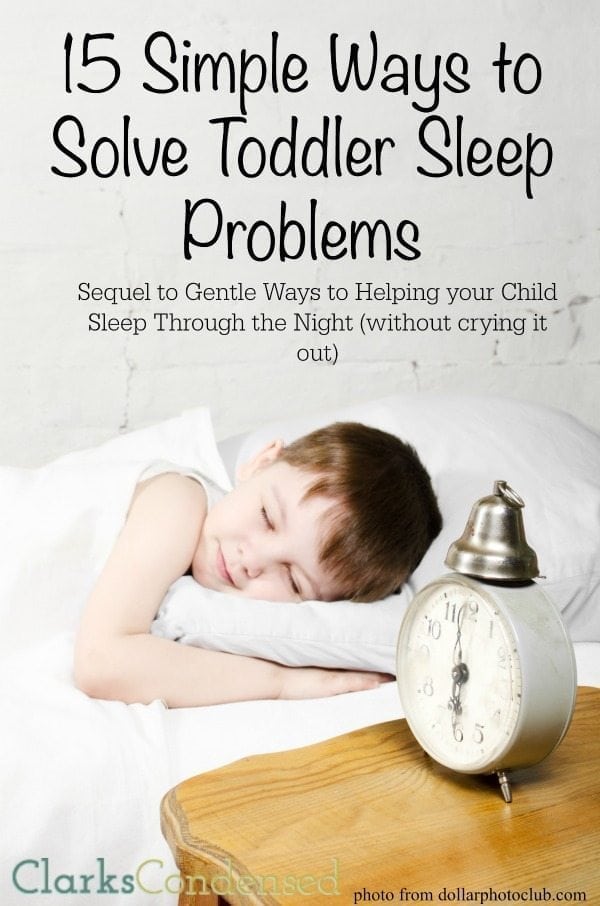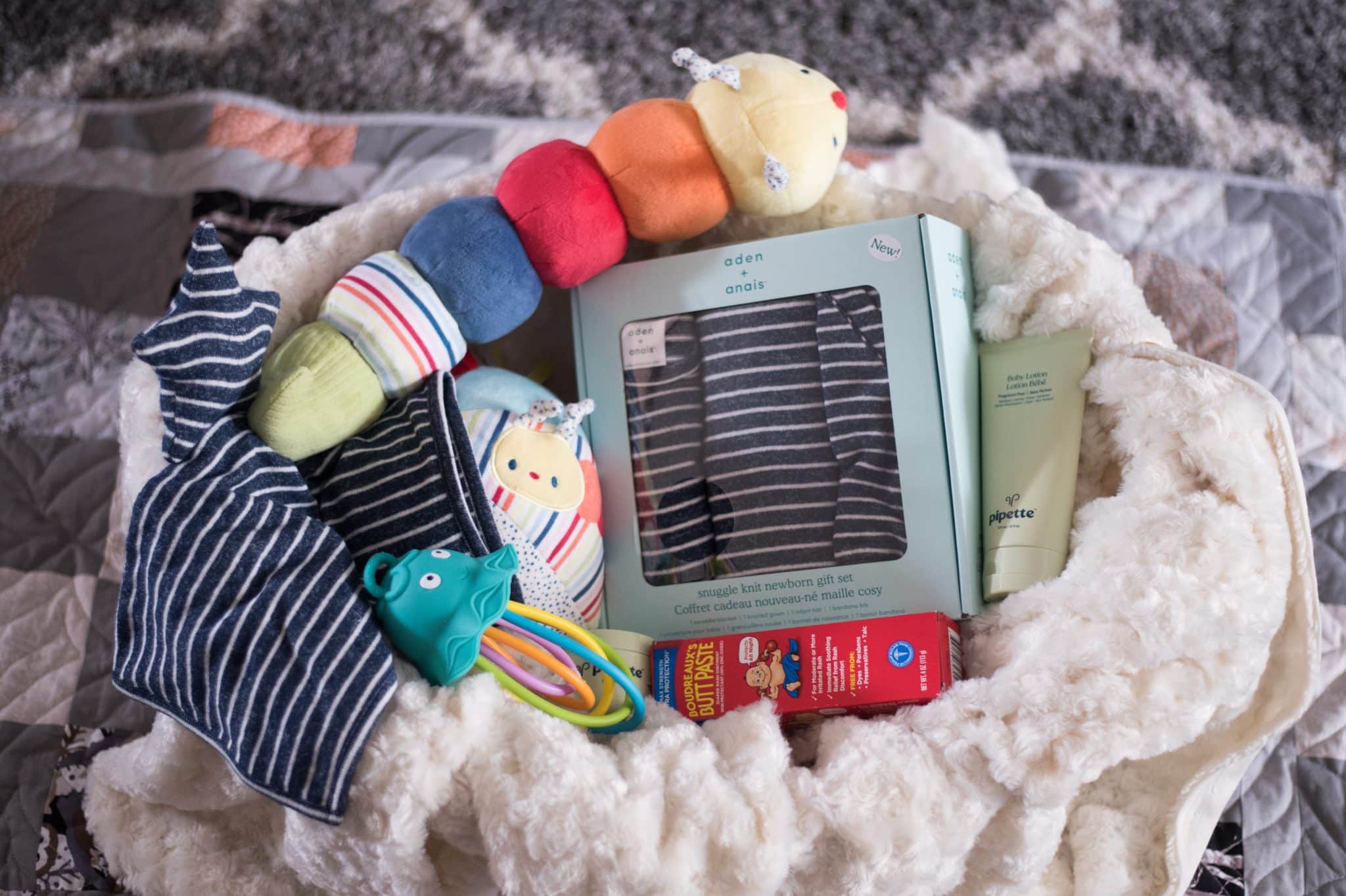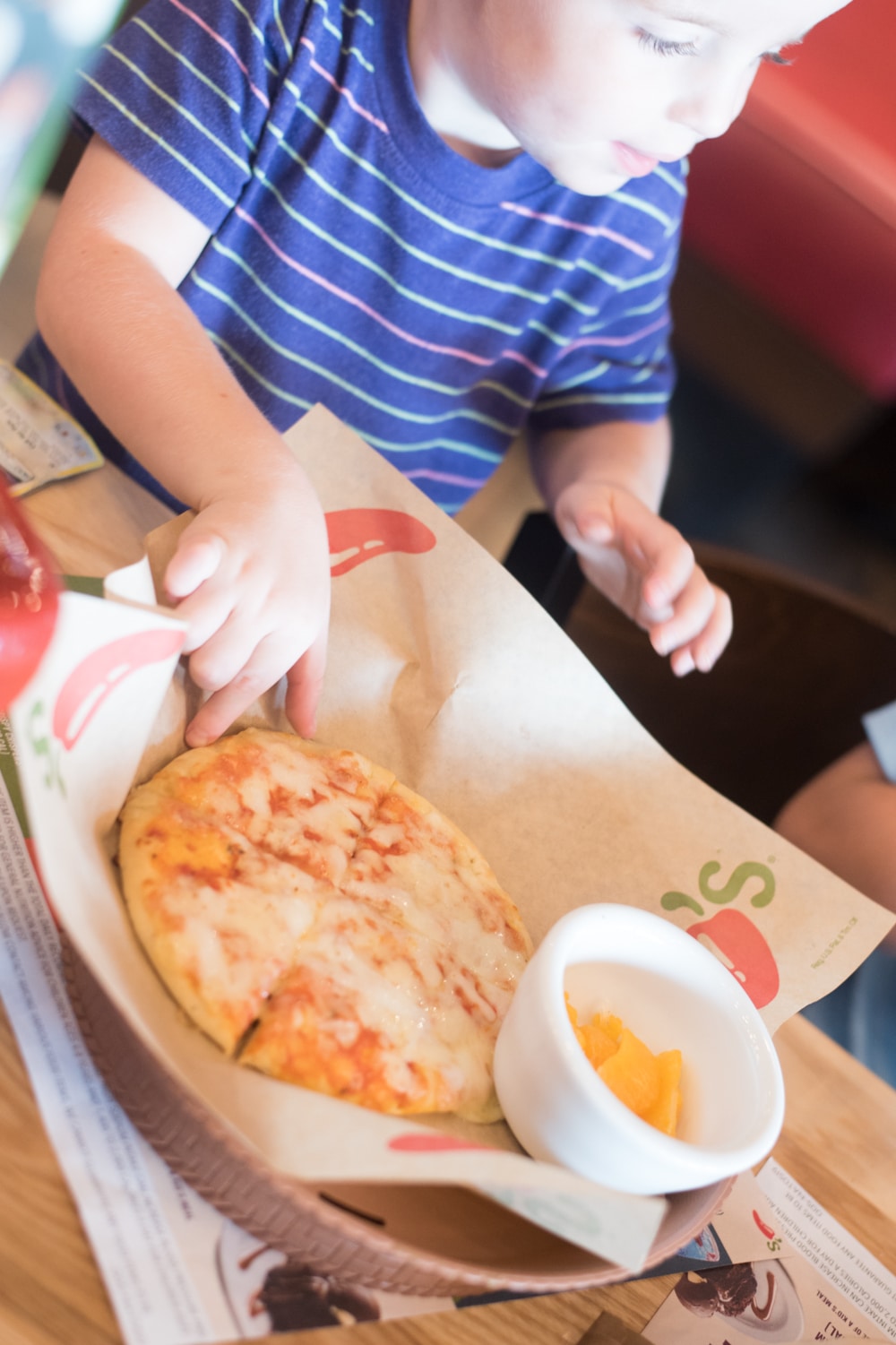How to Get a Toddler to Sleep: 15 Simple Ways
Do you have a toddler who has trouble sleeping? Here are 15 simple ways to help solve toddler sleep problems and get your toddler to sleep, so everyone has a better night!

How to Put a Toddler to Sleep
Several months ago, I wrote a post about gentle ways to help your child sleep through the night.
I was floored by the popularity of it, and it made me realize that sleep is a major issue for children, specifically babies.
In that post, I described the sleep issues we had with Jack. To put it simply, it wasn’t easy!
I often think back on his first year of life, and the memories are rather foggy, and I attribute that to the fact that he truly did not sleep well – at all. While much of it wasn’t his fault (due to health issues), it was hard on all of us.
If you are at that stage, let me tell you – it really does get better. Jack eventually started sleeping through the night and at the age of 3.5, I’m happy to say he falls asleep by himself, stays asleep all night, and he takes a very good nap during the day (sometimes hitting 3.5 hours!) I often joke that it’s our reward for surviving the days of little sleep.
I don’t believe it’s just good luck that Jack sleeps so well now.
We worked hard to help him feel comfortable, happy, and confident at bedtime. While I’m definitely not a sleep expert, here are a few tips and tricks for helping your toddler sleep a little bit better.
I know everyone has different parenting philosophies, so if you don’t agree with something I suggest…that’s just fine.
Just take the advice you need and be on your merry way 🙂 This advice is from my own experience, research, and talking to other parents.
Also, I was a HUGE fan of the No Cry Sleep Solution, and I was thrilled to see there was a sequel to it all about toddler sleep. Highly recommend purchasing this!
Getting a Toddler to Sleep
1. Schedule and Consistency
This is the number one tip I would give anyone when it comes to their child…on any number of topics.
It is so important to have a schedule with your child, and that is something I’ve discovered more and more as Jack grows up.
He thrives when we are consistent with what we do throughout the day.
He knows that when he wakes up, Daddy gets up with him (lucky me), gets him his breakfast, and he gets to watch a show.
He knows that we play for the first part of the day, and after lunch, it’s time to lay down in mommy and daddy’s bed for a nap.
After he wakes up, he knows he gets to play more, go to the gym, and have dinner.
And when we say it’s time to bed, he very rarely protests (the only time he does is when he wants to keep playing with his cousins.)
We certainly aren’t perfect, and there have been more than one occasion when Jack has gone to bed much later than his bedtime.
But overall, I believe that his schedule is what has helped him overcome his sleep issues and sleep well now.
Our daily schedule obviously varies, and it isn’t strict. We play most days by ear. His bedtime routine is pretty simple, but it’s something he counts on. Here’s what we usually do:
- We go to the bathroom and let him go potty (and if he’s in underwear, we change him into a diaper at that point).
- Then we brush his teeth. I usually brush his teeth for him first, and then I let him brush them himself while I brush my teeth.
- We go to his room to get pajamas on.
- He jumps into bed, we tuck him in, and he says a prayer
- Then either Forrest or I say another prayer (he usually picks who)
- We usually end up singing a short song, a bear hug, and then we say good night! I usually go to our room that’s across from his to do some work, and he likes knowing that I’m there. He falls asleep usually within about 10 minutes.
2. Remove Negatives from Routine
While I believe routine is important, I also think it should be a time that the toddler doesn’t dread.
For instance, Jack HATES baths. I can’t even explain it. He’ll play in a pool or run in a sprinkler all day long, but when bath time comes, it’s like he thinks we are torturing him.
So for us, bath time has never been a part of our bedtime routine. If your child hates baths, have them take one in the morning or earlier in the day, so they don’t associate the dislike of baths with bedtime.
If they don’t enjoy brushing their teeth, just make it a habit to do it after dinner or dessert and before bedtime.
I know it may be easier said than done, and there may be things that they have to do before bed that they don’t like, try and keep it a positive time.
3. Don’t Get Over Tired
The other day, Jack skipped his nap. It was a busy day, and it was just too hard to fit in. Let me tell you, it was not worth it!
By about 5:30, he was grumpy, mean, and hard to handle – which is not like him at all.
He ended up going to bed even a little later, because we had been at my parent’s house, and when we got home, it was difficult. He didn’t want to go to bed at all, despite being extremely grumpy.
Over the next few hours, he kept waking up and acted very disoriented, confused, and somewhat scared. That hadn’t happened to him in a very long time, so we know it was because of his lack of nap during the day.
There was recently a study that came out that said children are better off when they stop taking naps around the age of two. I couldn’t have disagreed more with this study.
I believe that children will drop their naps when they are ready, and if they will take naps – let them! I think that not being overly tired at bedtime is very important.
Something else to consider is to shift around nap time and bedtime. For instance, Jack will take a nap at noon, and he usually wakes up by three.
That gives us plenty of time to play outside and get him tired enough for bed at 7 PM. However, if your child naps from 3 to 5, it might be a little harder to get them to go to bed just a few hours later.
If you are finding a struggle between nap times and bedtime, try gradually moving their nap time earlier or adjusting when they go to bed. 15-minute increments is usually a good starting point.
4. Make Sure They Feel Comfortable
Would you want to go to bed feeling extra hot or extra cold? Or with a wet diaper, uncomfortable clothes, or in a room that you don’t feel comfortable in?
Chances are, your toddler doesn’t either! While you shouldn’t have to go to extreme lengths to make your child comfortable…at least make sure they are in a position where they aren’t struggling to fall asleep because of discomfort!
It may take some time to figure out your child’s ideal sleeping style. It can be hard if you have more than one child in the same room since everyone has different preferences, so it will probably just take some time and tweaking.
When we moved to our new house, it took Jack a while to sleep through the night in his room again. He would wake up scared in the middle of the night, or he would just have a hard time falling asleep in general.
Fortunately, we took some time to make sure he liked his room, and we made sure it was set up in a way that wasn’t scary to him. Now he sleeps great. Here are a few things to keep in mind:
Mattress – you don’t have to spend hundreds or thousands on a good mattress for your toddler.
Just make sure it’s quality enough that they feel comfortable on it. If you want, you could even take them to a mattress store and let them try out ones.
They may not really know what you are doing, but for older toddlers, it might be a good idea.
I think it even stems to the whole idea that children are more likely to like something if they are involved in the process!
Along the same idea, you could let them pick out their own bedding. I highly recommend the 5 Little Monkeys Bed! These mattresses are amazing for children! Use the code CLARK25 for $25 off.
Comfort items – most children become attached to some kind of comfort item in their early years. If it’s safe, and it doesn’t keep them awake or distracted all night
Music/White Noise – ever since Jack was a baby, we’ve used white noise with him.
When I was growing up, I would always listen to Primary songs from church as I fell asleep.
We LOVE the Hatch Baby Rest – it has soothing lights, sounds, and an “okay to wake” feature (more on that at the end of this post).
Don’t give your child juice or milk when they are in bed. However, giving up a leak-proof sippy cup can prevent them from calling you in the middle of the night to bring them something to drink.
Of course, this increases the likely hood of them having a wet diaper/needing to go to the bathroom in the middle of the night…so you just need to decide what’s more disruptive to their sleep!
This may seem like a given, but make sure that your child goes to bed with a fresh diaper (if they aren’t potty trained) and in clothes they feel comfortable in.
We love pajamas and “comfy clothes” around here, and Jack gets so excited every night when he gets to pick out what jammies he gets to wear.
It’s a good way to transition from day to night by changing out of jeans, khakis, shorts, etc.
Make sure the room isn’t too cold or too stuffy.
In Jack’s room, we have a ceiling fan which is nice for circulating air throughout the room and keeping it cooler.
During the summer, he wears lighter pajamas, has fewer blankets, etc. During the winter, we make sure the room is better insulated, and he has enough warmth.
When Jack is too hot or cold, he wakes up a lot more easily (so do I!)
A lot of children are scared of the dark.
It’s normal, and they eventually outgrow it! However, having a night light can help them feel more comfortable.
For Jack, we just keep his door open and a hall light on until he falls asleep, and that works just fine for him (he would never let us shut the door!)
Other children may need a little extra night all night, so a simple outlet night light should help.
5. Wind down before bedtime
It’s not a wise idea to go straight from having non-stop fun to bedtime. Children need time to calm themselves down from their daily activities. While you can go about this in a variety of ways, here are a few ideas:
- Don’t allow screen time starting 1-2 hours before bedtime.
- After dinner time, encourage quieter activities like coloring, reading books, doing puzzles
- Bath time
- Cuddle in your bed and read books together (this is something we do with Jack, and he loves it and gets extra tired.)
- Avoid sugary treats close to bedtime
It’s just important for them to feel somewhat drowsy when they are getting into bed. Sugar, high energy activities, and electronics can wire their brains to stay awake for longer.
6. Make Changes Slowly
Toddler-age is the time of many changes for little ones – transitioning to a toddler bed, potty training, taking away pacifiers, shorter naps…maybe even the introduction of a new sibling!
Try to avoid making too many changes at once and when you do make changes, I think gradual is usually the best.
7. Wake Them Up
This is a tip I’ve seen floating around the Internet (recommended to many by their pediatrician), and it makes sense to me.
If your child has a habit of waking up around the same time every night, gently wake them up before it happens.
Obviously, if it’s like three AM, I don’t recommend setting your alarm so you can go in and wake them up then.
However, you could do it right before you go to bed.
Don’t get them all riled up, but just go in, gently wake them, give them a hug, or even take them to the bathroom, and then take them back to bed.
It may seem a little counterproductive, but from what I’ve heard, it actually works and helps break up deep sleep.
8. Play Outside and Limit Screen Time
There’s a lot of articles out there about avoiding too much screen time with your children, including toddlers.
Whenever we take Jack to a well-child appointment, they ask us how much he gets a day.
While we aren’t against letting Jack watching TV or play a game on our iPad, it is important to make sure they aren’t just sitting and doing that all day.
I know that when I’ve been working on the computer for a good portion of the day, especially in the latter part, it’s a lot harder for me to fall asleep.
However, when I exercise and spend time outside, sleep comes a lot easier for me, and I believe this is true for children.
Go outside and let your child toddler play in the sun for a while. It gets their energy out, the natural Vitamin D is great, and it’s good for everyone’s mood.
9. Blackout curtains
Many young children think that as soon as the sun wakes up, they should wake up too!
When the sun rises after 7, this can be just fine…but when it is up earlier than that, it can be really hard!
I’ve found that the times that Jack sleeps in the latest is when we are in a hotel that has blackout curtains.
If your child is very sensitive to light entering their room, this is a great investment – you can even make them yourself!
10. Wake Up Cues
Try and teach your child cues of when they can wake up.
This may take a while to get them to take to habit, but I’ve heard a lot of success with wake up cues.
One that I’ve heard of is using a toddler alarm clock. It turns green at a specific time, which indicates when your child is able to come and get you.
You could do all sorts of things – wait until they smell breakfast, until the sun is up, etc.
11. Late Snacks
Even though toddlers can go much longer without eating than they could when they were babies, they still have small tummies!
If your child wakes up in the middle of the night, it could definitely be because they are hungry. I even wake up in the middle of the night hungry on occasion.
I wouldn’t give them a snack in the middle of the night, but you could try giving them a protein-packed snack about an hour before bedtime.
This will hopefully keep their stomachs full for longer. Avoid sugary treats or empty calories, because these won’t do much to keep them satisfied all night long!
Giving your child snacks that have natural levels of tryptophan might help them sleep better, as well.
12. Explain
With Jack, I found that the more we explained when he was allowed to wake up mommy and daddy, the easier it was.
I don’t think young kids get enough credit – they are like sponges and truly soak up everything around them!
I think sometimes, simply explaining to your child when they can wake up, how they are safe in their room, etc. goes along way.
For instance, we recently moved Jack to a toddler bed. He was so excited!
Well, the first night in it, he decided to leave his room when he woke up in the middle of the night and climb into our bed.
We didn’t even notice at first, but after a while, Forrest nor I slept very well (Jack, on the other hand, slept like a rock.)
So the next day, I explained to him that it’s so fun that he can get in and out of his bed by himself, but he needed to wait until his room had the sun in it to come into mommy’s bed.
The next day, around 7:15, he calls out, “Mommy, can I come in now?”
I was so surprised that he caught on so quickly, and even though it was tempting to just come in when he woke up in the middle of the night, he didn’t.
13. Set a timer for Bedtime
Jack is the master staller.
He is constantly calling out after bed for a train, or a drink of water, or another blanket.
Sometimes he really needs something, but most of the time, it’s just him wanting us to come back into him.
One way to limit the amount of time they spend calling for something is to set a timer.
Tell your child that they can ask for things up until the timer goes off.
As soon as the timer goes off, they shouldn’t call for anything else, unless it’s an emergency. It can even become a little bit of a game – how much can you get done before the timer goes off!
14. Self-soothing
A big part of a child sleeping well is their ability to self-soothe.
This can be a hard concept to teach. Even if your baby learned this skill, sometimes, toddlers will “un-learn” it, especially during times of transition, like moving to a toddler bed.
To be honest, I don’t have a lot of experience in this. Jack just eventually learned…and quite honestly, I think that’s the case with most kids.
They just learn at their own pace, and when they are ready.
In this post, Dr. Laura provides some tips for helping toddlers in the night that I think is worth reading.
15. Falling out of Bed
Even though Jack loves his toddler beds, he falls out of almost every single night! He rolls around quite a bit in his sleep, so it’s not too surprising, but it does wake him up and scare him.
While he doesn’t take long to calm down after I put him back in his sleep, uninterrupted sleep is better for all of us!
Falling out of bed usually isn’t super dangerous (unless they are really high off the ground, or there are toys on the ground next to the bed), but it’s definitely something to try and resolve.
So, if your toddler falls out of their bed often, here are a few ideas.
- Buy a toddler bed with a guard rail (many of them do, however, ours doesn’t. We just converted his crib into a toddler bed, and while one side still has the crib side, the other does not.)
- Buy a guardrail to attach to the bed (these are only recommended for children 2 and up)
- Place a noodle under their bedsheet on the edge of their bed. Some people recommend wrapping a blanket around it first so it doesn’t shift.
- Put blankets or a pillow on the ground, so if they do fall out, it’s at least not on the hard floor
- Make sure there aren’t any toys, sharp edges of furniture, etc. close to the child’s bed
- Buy a bigger bed
- Put bed up against a wall so there is only one side they might fall out of instead of two
My Experience with My Second Child:
I wrote this post when Jack, my firstborn, was about 3 1/2 years old. Since then, I’ve had Oliver, and he’s almost three now (time flies!)
We had our fair share of sleep problems with Oliver, and we actually had to change our approach a little bit. I realized that what worked for one child may not work for the next, and you have to be willing to adapt. Here are a few things we did differently:
- We co-slept until Oliver was 15 months, and he was waking up CONSTANTLY. When we moved him to his own space, he did significantly better.
- We use a full-size mattress for him instead of a toddler bed. It makes it easier for me to lay down with him.
- We stopped naps when he was 2.5 years old. It was painful for me to do that, because Jack took naps FOREVER. However, we had some major power struggles (Oliver is my strong-willed toddler). He would take hours to fall asleep at night, and I got more than one toy chucked at my face in his frustration. I finally decided to cut out the naps, and our lives got so much easier. He falls asleep in seconds, sleeps all night, and we are all just happier.
BONUS: What to do When They Wake Up in Middle of the Night
So, this is definitely a controversial topic, mainly when it comes to babies. However, I often see people discussing what to do when their child wakes up in the middle of the night. Here’s a few different options for toddlers, and what we do:
Make Sure They are Okay
Sometimes, your child might wake up from a night terror or after having a bad dream.
They may have even fallen out of their bed!
You’ll probably be able to discern between a whimper in the night, and a scream of pain or terror.
If they sound terrified or scared, I think it’s important to make sure they are okay and comfort them.
Jack experienced night terrors quite often up until a few months ago. I wrote all about that in this post – What Everyone Parent Needs to Know About Night Terrors – but with night terrors, you can’t really console the child until the snap out of it. However, whenever these would happen to Jack, I did like to be nearby.
Send them Back
Many parents just send their kids back to their room if they come in the middle of the night.
Some will take them back and tuck them back in, while others just tell them to go back on your own.
If you don’t want your kids in your bed or your room, then this is probably the method for you!
Let them Sleep on the Floor
Maybe you don’t want your child to be in your bed, but you don’t mind if they are in your room. Let them know that if they come in their room, they will have to sleep on the floor.
Some kids will quickly discover their beds are much more comfortable, but others will just find comfort being there.
Let them Sleep in your Bed
I think it’s a personal decision, and there’s really no right or wrong answer.
I know some people let their kids sometimes camp out on the floor, others will take them back and tuck them back in, and others just tell them to go back to bed.
On the occasion that Jack wakes up in the middle of the night, I’m too tired to even remember it.
If he doesn’t go to sleep when I call to his room, “It’s okay, go back to sleep” (which, quite often, he will), I usually go and get him. We all fall asleep and sleep just fine (especially now that we have a King Size Bed).
I personally don’t think it harms him, and he doesn’t expect to sleep in our bed every night. This may not be the case for every child, and I can totally understand not wanting your child in your bed.
However, for us, I’ve found that often it just makes life a little easier when I let Jack sleep in our bed.
This post was originally written in April 2015; it was updated in January of 2020.
OTHER POSTS YOU MAY ENJOY:
- Flying with a Toddler: The Ultimate Guide to (Almost) Stress-Free Flying
- 9 Truths About a Strong-Willed Toddler
- Toddler Snack Ideas









These are such great tips! We’ve been blessed with three great sleepers, but sometimes they wake up in the middle of the night and have to come sleep with us for a bit before heading back to bed!